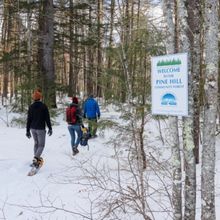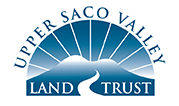USVLT Celebrates Expansion of the Pine Hill Community Forest
Project awarded $284,000 by the United States Forest Service and the New Hampshire Land and Community Heritage Investment Program
The Upper Saco Valley Land Trust (USVLT) is excited to announce the expansion of the Pine Hill Community Forest in Conway, New Hampshire. The Land Trust purchased an additional 134 acres on January 31, growing the Community Forest by 30%. The New Hampshire Land and Community Heritage Investment Program (LCHIP) awarded $94,000 to USVLT to support the project, and the United States Forest Service granted $190,000 through their national “Community Forest Program.” Other funds were generously donated by the Town of Conway, the Gibson/Woodbury Charitable Foundation, the Kendal C. and Anna Ham Foundation, the Robert & Dorothy Goldberg Charitable Foundation, the Fields Pond Foundation, the State Conservation Committee (also known as the “Moose Plate” grant), donor-advised funds from the NH Charitable Foundation, and several private individuals.
The addition of the 134 acres allows for expansion of the existing trail network, as well as the construction of two new public parking areas and trailheads. Situated in the “triangle” between Route 16 and Route 302 in Conway and surrounding the Kennett High School (KHS) Campus, the nearly 600-acre expanded Pine Hill Community Forest is home to the Conway Rec Path and the new “Ravine Trail,” and is popular with hikers, runners, mountain bikers, and snowshoers. It provides outdoor learning space for KHS students, protects the water quality of the Saco River, and provides forested habitat for wildlife.
“We are very proud to be able to expand Conway’s beloved Pine Hill Community Forest,” said Abby King, USVLT’s Conservation Lands Manager. “The Community Forest Program award, the LCHIP award, support from the Town of Conway, and donations from many other funders were critical for this project. This expansion will help address challenges we’ve had with creating better access points, trailheads, and trails on the property. It will protect more habitat for plants and animals and create greater opportunities for outdoor education, alternative transportation, and recreation for all.”
The Pine Hill Community Forest is managed to balance ecological and social values for the long-term benefit of the natural and human communities in the Mount Washington Valley. Management decisions are made by the Pine Hill Management Committee, a multi-stakeholder group. Members of the management committee include Tin Mountain Conservation Center, Kennett High School and the Conway School District, the Mount Washington Valley Trails Association and Rec Path Committee, the Mountain Meadow Riders Snowmobile Club, and the Town of Conway.
The US Forest Service’s Community Forest Program grant of $190,000 to USVLT for this project is one of ten awarded in 2021 across nine states, totaling $4 million in support. The grants include financial assistance to local governments, Indian tribes, and qualified nonprofit organizations to create, expand and enhance community-owned and community-managed forests. Since 2012, the program has supported 88 projects across 25 states and territories and permanently conserved more than 24,000 acres.
LCHIP’s $94,000 award to USVLT for the Pine Hill Expansion Project is one of 40 announced in November 2021. Ben Wilcox, LCHIP’s Board Chair (and Cranmore Mountain President & General Manager), said: “In 2021, LCHIP awarded $4.7 million to historic preservation and land conservation projects in all ten counties of New Hampshire. I’m thrilled that the Pine Hill Community Forest Expansion project was among them. The forest, located right in the heart of Conway, offers so many opportunities to Kennett High School students and athletes, and the expansion creates even more opportunities to collaborate with the Tin Mountain Conservation Center.”
About The Upper Saco Valley Land Trust
The Upper Saco Valley Land Trust is a 501(c)(3) non-profit organization. Our motto is “Preserving Land for Community Benefit.” USVLT has completed 81 conservation projects since 2001, totaling over 13,000 acres throughout the towns of Hart’s Location, Bartlett, Jackson, Albany, Chatham, Conway, Eaton, and Madison in New Hampshire, and Brownfield, Denmark, and Fryeburg in Maine. Learn more about the Pine Hill Community Forest and the Upper Saco Valley Land Trust’s other projects by calling (603) 662-0008 or visiting www.usvlt.org.
About the USFS Community Forest Program
The Community Forest Program of the US Forest Service helps communities acquire and conserve forests that provide public access and recreational opportunities, protect vital water supplies and wildlife habitat, serve as demonstration sites for private forest landowners, and provide economic benefits from timber and non-timber products. Visit the Forest Service website at www.fs.usda.gov for a complete list of projects and organizations receiving grants under the Community Forests Program.
About New Hampshire’s Land and Community Heritage Investment Program
The New Hampshire Land and Community Heritage Investment Program is an independent state authority created by the legislature in 2000. LCHIP’s legislative mandate is to ensure the perpetual contribution of natural, cultural and historic resources to the economy, environment, and quality of life in New Hampshire. LCHIP does this by providing matching grants to New Hampshire municipalities and non-profits to conserve and preserve the state’s most important natural, cultural and historic resources. The program has provided 530 grants which have helped to conserve close to 300,000 acres of land for food production, water quality, ecological values, timber management and recreation and has supported projects to study and rehabilitate 324 historic structures and sites. Grants have been awarded in all parts of the state and in 179 of New Hampshire’s 234 communities. Fifty-four million dollars of state money have led to a total project value of more than $312 million. The money for LCHIP grants comes from fees on four kinds of documents recorded at the Registry of Deeds in every county of the state. For more information about LCHIP, visit LCHIP.org or call (603) 224-4113.


